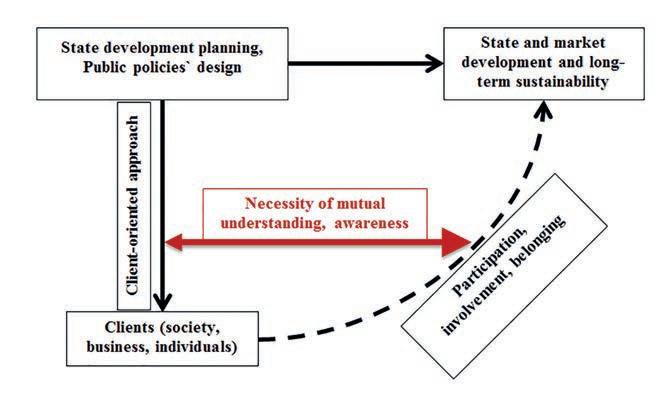Public Services Client-Accordance Through Coproduction and Digitalization Romans Putans*, Zane Zeibote**
Summary: The role of the societies and their interaction with public administration is changing toward ever closer co-operation. Since 2009 scientific literature and the public administrations themselves have been increasingly exploring the changing and dynamic role of the recipient of public services, a client or a customer, as that of a partner in the provision of public services. In this article the authors propose a policy client-accordance index (PCAX) methodology to measure the relevance of a) policy planned results and policy-makers’ expectations in relation to b) clients’ intentions, and explore the co-production in the age of digitalization based on a case study. The idea of the article is to contribute to this necessity of new tools and approaches to facilitate the co-operation and co-production between policy makers and society. The main goal of the research is to analyse the applicability and challenging aspects of the feasibility of PCAX and to test the possible transfer of the developed methodology model for evaluating the relevance of any public administration policy to the intentions of the policy‘s respective target group, i.e., the client-accordance index of a given public policy. In the first and the second chapters of the article, mostly based on the findings of scientific literature analyses, the authors explore the increasing topicality and the need of changing awareness of a public a service and its provision. Further in-depth analyses are conducted on the possible methodological tool to measure the relevance between the policy makers’ decisions (expectations) and society‘s needs * Romans Putans, Dr.sc.admin, is the head and full-time lecturer at the Department of International Business and Economics in Riga Stradins University (Latvia). He obtained doctoral degree in Business Management from the University of Latvia in 2016. His scientific interests and research lie in the field of societal governance, its conceptual developments and currently particularly co-production. Contact: romans.putans@rsu.lv ** Zane Zeibote, Dr.oec. is the Project Manager at the Centre for European and Transition Studies of the University of Latvia. She has PhD in Regional Economics from Latvia, M. A. in the Economic Policy Management from the McGill University of Canada and Master’s degree in Economics from the University of Latvia. Her research interests and work are focused on the economic competitiveness of regions, cluster development, digitalization and improved governance. Contact: zane.zeibote@lu.lv
121



